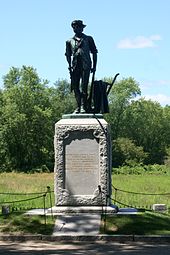 |
| Image from http://www.shsu.edu/~his_ncp/LexCon.html |
Today marks the 136th anniversary of the battles at Lexington and Concord, which sparked America's war for independence.
For many years, the colonists had been growing increasingly disgruntled with British infringements on their liberty. They had tried various means, from petitions to protests, in an attempt to influence Parliament and King George III to recognize their rights as Englishmen and cease the unjust and unlawful oppression. But, as Thomas Jefferson would write in 1776, "Our repeated petitions have been answered only by repeated injury." Instead of honoring the colonists' rights, Parliament implemented still greater and more coercive measures, intended to keep the colonies under control. As more British troops were sent to America, the patriots organized to prepare to defend themselves should diplomacy fail. When General Gage, the British military commander in Boston, sent soldiers to capture weapons and ammunition stored at Concord, the colonists were ready. On April 18, the night before the raid was to take place, several riders set out to alert the countryside. Paul Revere is now the most famous of these riders, but several others participated, including William Dawes and Samuel Prescott. By the time the regulars began their march, the militia had been awakened and was mobilizing.
When the British forces arrived in Lexington on their way to Concord, they met about 80 militiamen, led by Captain John Parker, waiting for them. A British officer, probably Major John Pitcairn, ordered the colonists to lay down their arms. Parker told his men to disperse. Both sides had been ordered to hold their fire, but in the confusion that followed, a shot pierced the morning air. To this day, no one is certain who fired the shot. More shots soon followed from both sides. Eight militiamen were killed and one British soldier was wounded. The "Battle" of Lexington was really only a brief skirmish, but it marked the beginning of a war that would change the history of America and of the world.
The regulars reached Concord, where a larger force of militiamen met them. This time the colonists killed and wounded several more of the British. As the redcoats marched back to Concord, they suffered many more casualties from ambushes by groups of minutemen. A small group of men had dared to stand against the might of the greatest military power in the world.
Today, take some time to remember the men who fought and died to make this nation free. Because of their sacrifice, the United States has been a free nation for more than 200 years. Are we prepared to make the same sacrifice, if necessary?
 |
| By the rude bridge that arched the flood, Their flag to April’s breeze unfurled, Here once the embattled farmers stood, And fired the shot heard round the world. —Ralph Waldo Emerson |
No comments:
Post a Comment